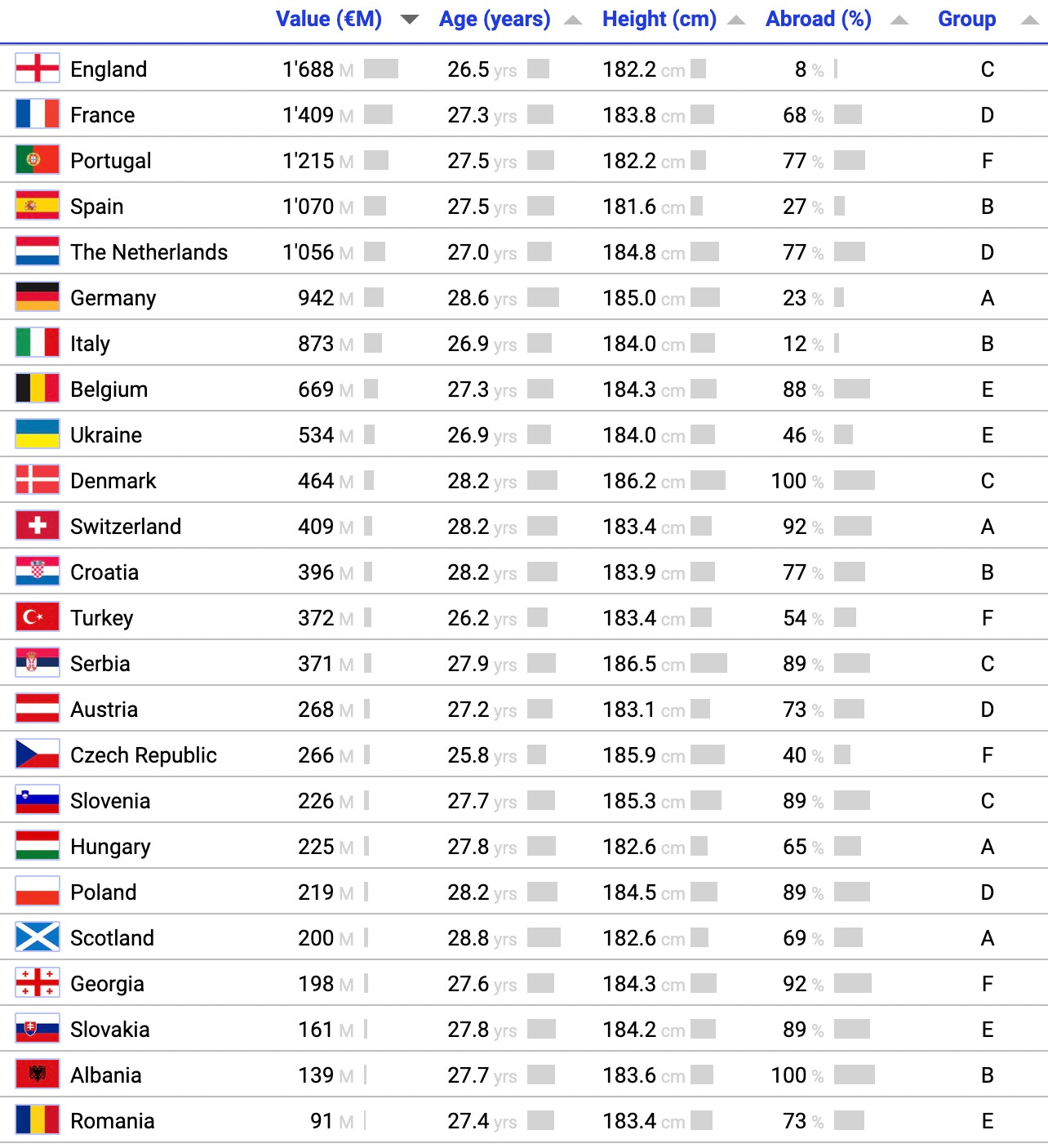EUROCASH #8 - Our model decides: the winner of Euro 2024 is ...
Which team will be champions in Germany? And which players are selected by the Sporting Intelligence model for the most valuable XI in the tournament?
The eighth and final day of this preview series about Euro 2024 ends with the Sporting Intelligence prediction of which 16 teams will progress to the knockout stages and who will win every match from that point onwards.
These predictions are based on the insurable values of the 24 squads using a model that correctly predicted Germany would win the 2014 World Cup at a time they were fourth favourites, and correctly predicted France would win the 2018 World Cup at a time they were fourth favourites, and was close to predicting the group and knockout outcomes of the 2022 World Cup.
For the background and detailed methodology of this model, see the first day of this series.
There are, of course, many ways you can try to predict the outcome of a major football tournament.
Betting odds will aways be a guide while not necessary being precisely right. For Euro 2024, many bookmakers’ odds suggest England will win, as really marginal favourites, although some international sports books think England and France are neck and neck.
World rankings from FIFA are another predictor of success, in which case France are favourites because they are the European team with the best ranking now, at No.2, behind Argentina.
And if you use ELO rankings for international teams, you’ll also have France as the best nation in Europe, and the best in the Euros, followed by Spain, Portugal and Belgium, with England as low as fifth among the Euro 2024 contestants.
Expertise, in the form of a pundit steeped in experience of playing in major competitions and watching them, can obviously be a guide. Thomas Hitzlsperger has been our pundit for this series and he’ll give his view below.
And then there’s form. Is form important going into a major tournament or does the competition itself entirely change the dynamic? There are arguments on both sides but in case you’re wondering, here is a form table for the last 10 matches played by each of the 24 nations competing.
The CIES Football Observatory published research in the past few days that ranks the 24 nations by a number of metrics, including “squad competitiveness” which is calculated “through an index weighting the minutes played over the last year by footballers selected by the sporting level of their matches.” You can read their full reasoning here but the upshot is Germany pip Spain as tournament favourites by that measure, with France and England next.
Another metric they consider is the value of each squad, or the collective predicted transfer values of all the members of each squad. By that metric, England come out on top, followed by France, Portugal and Spain. Here’s their full table.
One other predictive tool to consider before we get to the Sporting Intelligence model - and this one is tongue-in-cheek but with underlying validity - is to consider each squad’s weakest link.
I would argue that if a national team squad includes any players earning their living in club football in Cyprus, then their talent pool is insufficiently deep to triumph at a major international event. Cyprus is ranked at No.23 in UEFA’s country co-efficient list.
On that basis, we might say that Hungary, Croatia, Romania and Georgia can all be ruled out as winners of Euro 2024 because they all have at least one player earning their living in Cyprus club football.
Extending the logic, we might also say any squad featuring a player who earns their living in Russia (the No.22 UEFA nation) can be discounted, which rules out Albania, Slovenia and Serbia.
And taking it further, any nation that has somebody playing in Denmark can be ruled out. This knocks Scotland out; Scott McKenna was most recently playing for Copenhagen and is out of contract at the end of this month.
This is absolutely not a slight on Denmark, but even Denmark’s squad for the Euro 2024 includes zero players who earn a living in Denmark.
Let’s say we can also rule out any team who have players currently contracted to clubs in Greece (UEFA No.15 nation) or Norway (No.14 nation by UEFA co-efficient). There go Turkey, Switzerland, Poland and Austria.
Flipping this methodology on its head - and yes, it’s just one more way to measure things, and shouldn’t be taken too seriously - which Euro 2024 squads comprise only players who play in either one of the Europe’s top five leagues (in England, Italy, Spain, Germany or France), or in their home nation, or in Saudi Arabia, which has thrown gazillions of pounds at a few handfuls of elite players?
That would narrow contenders for Euro 2024 down to seven: Germany, Spain, Italy, England, the Netherlands, France and Portugal.
But this series hasn’t been about any of the above. It’s been predicated on Sporting Intelligence’s insurable values of players.
And it’s time to fill in our tournament wallchart by finding out how our model forecasts the knockout phase will unfold, and which players make the MVP XI - the most valuable starting line-up across the tournament.






